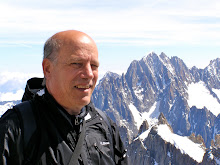Decades of denial
08/30/05
The juxtaposition of images was unsettling.
On Sunday, as weather satellites showed the massive hurricane bearing down on New Orleans and as the director of the National Hurricane Center warned of the potential for catastrophic damage, President Bush vacationed in Crawford. Two days later, as televised aerial images showed the flattened wasteland of Gulfport, Miss., a rising lake around New Orleans homes, and daring helicopter rescues of survivors, the president ventured out to give a speech - not about what may prove to be America's worst natural disaster but about Iraq, comparing his resolve there to that of FDR in World War II.
W. seemed out of sync and out of touch. Yet there was an ironic symmetry to these images, some of what may be America's worst natural disaster and others of the president seeking a new rationale for one of the country's worst self-inflicted disasters. Both scenes seemed fused to decades of failed energy policies, policies for which there's more than enough blame to spread across both political parties.
Consider the President's Tuesday speech. In it, he opened a new front in his battle to shore up support for America's presence in Iraq: It is necessary, he said, to protect that nation's vast oil fields.
That same day, in a forceful column in The Boston Globe, author Ross Gelbspan wrote that Katrina embodies America's failure to slow global warming by curbing our insatiable appetite for burning oil and coal. It's a note he'd sounded passionately before in his 1998 book, "The Heat is On."
"In November 1995, 2,500 leading climate scientists announced that the planet is warming because all the emissions from coal and oil burning are trapping in more of the sun's heat than is normal for our climate," Gelbspan wrote then. "...The catalog of anticipated effects ...reads like a bibical apocalypse. Scientists say these consequences will include not only more extreme temperatures, with hotter heat and colder cold, but also ... extraordinarily destructive hurricanes...."
Despite such warnings, this country has done little to combat the so-called Greenhouse Effect or to set a rational course of energy conservation and conversion.
It was a quarter century ago, on July 15, 1979, that then President Jimmy Carter referred to America's need to confront and solve its energy problems as "the moral equivalent of war."
"Why have we not been able to get together as a nation to resolve our serious energy problem?" he asked, calling for a crash program to develop alternative fuel and to conserve. If it had been enacted, Carter's vision might have curtailed America's growing addiction to Mideast oil -- such as that in the fields of Iraq. And it also would have cut the waste gases building up in the environment, speeding global warming. Maybe, just maybe, a less destructive hurricane would have roared up the Gulf.
But history records that Jimmy Carter lost the presidential election resoundingly in 1980 and Americans, embracing Ronald Reagan's "Morning in America," lost any will to sacrifice and conserve.
Cars today guzzle just as much gas per mile as they did then. (The abysmal miles per gallon rate of SUV's isn't even counted in these figures; they're considered trucks.) And this year, after years of stalemate and with significant bipartisan support, Congress passed an energy bill that gives little more than lip service to conservation or renewable energy.
Nor can we, as America's citizens, complain about our elected officials. For it is we who have flocked to buy those SUV's and hired contractors to build bigger houses to boot, homes that demand more air conditioning and heat -- and use more energy sources that strain supply and contribute more to global warming.
"The energy crisis is real. It is worldwide. It is a clear and present danger to our nation," President Carter said back then. Twenty-six years later, we're still fiddling while New Orleans sinks and gas prices rise.
The immediate cost is evident at my neighborhood service station: Regular gasoline there cost $3.29 a gallon yesterday, roughly 15 cents for each local mile driven.
The longer-term cost will be greater. Scientists already are debating whether we've waited too long to reverse the process of global warming. But surely intelligent policy could slow it down.
No one can say with certainty that a given storm, Katrina, resulted from global warming. But we can say with certainty that insurance companies have had to shell out billions more in catastrophic coverage over the last decade than previous decades. We can say with certainty that this summer has seen a remarkable surge in early-season hurricanes and tropical storms. We can say with certainty that mean temperatures in much of the world are on the rise. And we can say with certainty that American politicians, the public and the press have yet to make global warming or energy independence priority issues.
The time to do so is long overdue.

